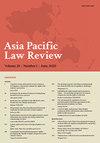Rethinking Chinese Politics
IF 1.7
4区 社会学
Q2 LAW
引用次数: 0
Abstract
The Chinese Communist Party’s 20th Party Congress, held in October 2022, was seen by many observers as a norm-smashing event. As expected, Party Secretary Xi Jinping broke with prior precedent and was appointed to a third five-year term. Other seemingly well-established norms were broken as well: the age 68 retirement rule was suspended for Politburo members Wang Yi, 69, and Zhang Youxia, 72, as well as for Xi himself, also 69. The informal norm that those who hadn’t reached retirement age would hold onto their Politburo seats was also dispensed with, which meant that key figures like Wang Yang were unceremoniously shoved into early retirement. Premier Li Keqiang’s departure signalled the end of the prior norm of balancing among groups or factions on the Standing Committee – Li was a member of the Central Party School faction, which had served as the path to power for many senior leaders prior to Xi’s tenure. Perhaps most crucially, the lack of any relatively young officials on the Politburo Standing Committee (PSC) meant that Xi had declined to anoint a successor. (Hu Jintao and Jiang Zemin had been forced to do so, in both cases years before they stepped down.) The results of the Party Congress made clear Xi’s intention to rule China indefinitely, perhaps for life. Only Chairman Mao, alone among PRC leaders, has been able to accomplish that feat. But are Xi’s appointment to a third term, and his moves to stock the Politburo with loyalists, in fact unprecedented? Or would the outcome of the 20th Party Congress be better described as a reversion to the CCP’s historical pattern? In his important new book, Rethinking Chinese Politics, Joseph Fewsmith argues that the extent of institutionalization of elite Chinese politics has been overstated, and that the norms governing promotions, transfer of power, and powersharing that emerged over the past forty years were in fact quite weak. A better account of Chinese politics would focus instead on the efforts of senior leaders to hold onto as much power as possible, and on the CCP’s desire to preserve the flexibility and responsiveness that are a key part of its Leninist structure. To be sure, nascent norms did emerge in the 1980s, and have played a role in shaping elite politics since then. After the calamity of the Cultural Revolution, the CCP leadership embraced reforms that would, they hoped, turn the page on a disastrous decade. Importantly, however, these reforms were meant to strengthen the Party’s hold on power. They were simply not meant to turn China into a multi-party democracy, or to turn the Party-state into a Weberian-style technocratic bureaucracy. At first glance, the Deng-era set of reforms seemingly worked: Jiang Zemin was elevated to the chairmanship of the CCP in the aftermath of the 1989 Tiananmen Square crackdown, and went on to serve two terms as Party leader, from 1992 to 2002. His successor, Hu Jintao, was elevated to the Politburo Standing Committee (PSC) in 1992, allowing him to gain administrative experience and build relationships with other senior leaders before he himself took the reins from 2002 to 2012. Hu’s elevation also made clear to the Party leadership that Jiang would be term-limited, and that he would not be allowed to choose his own successor. The反思中国政治
2022年10月召开的中国共产党第二十次全国代表大会被许多观察人士视为一次打破常规的活动。未到退休年龄的人可以继续担任政治局常委的非正式规定也被取消了,这意味着像汪洋这样的关键人物被随意地提前退休。在中国领导人中,只有毛主席能够完成这一壮举。还是说,20次党代会的结果应该被更好地描述为中国共产党历史模式的回归?Joseph Fewsmith在其重要的新书《反思中国政治》中指出,中国精英政治的制度化程度被夸大了,过去四十年中出现的管理晋升、权力转移和权力分享的规范实际上相当薄弱。对中国政治的更好描述应该是关注高层领导人尽可能多地掌握权力的努力,以及中共保持灵活性和反应能力的愿望,这是其列宁主义结构的关键部分。诚然,新生规范确实在20世纪80年代出现,并从那时起在塑造精英政治方面发挥了作用。在文化大革命的灾难之后,中共领导层接受了改革,他们希望这将翻开灾难性十年的一页。然而,重要的是,这些改革旨在加强党对权力的控制。他们根本不是要把中国变成一个多党民主国家,或者把党国变成一个韦伯式的技术官僚官僚。胡的晋升也向党的领导层表明,江将是有任期限制的,而且他将不被允许选择自己的继任者。的
本文章由计算机程序翻译,如有差异,请以英文原文为准。
求助全文
约1分钟内获得全文
求助全文

 求助内容:
求助内容: 应助结果提醒方式:
应助结果提醒方式:


